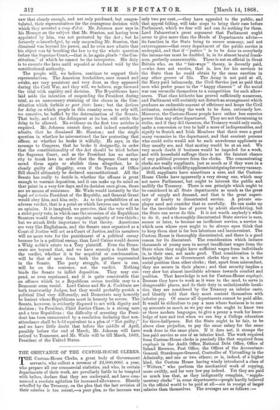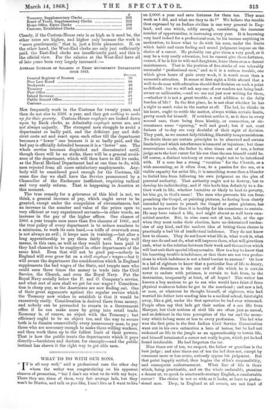THE GRIEVANCE OF THE CUSTOM-HOUSE CLERKS.
THE Custom-House Clerks, a great body of Government servants, who collect a revenue of 22,000,000/. a year, who prepare all our commercial statistics, and who, in certain departments of their work, are peculiarly liable to be tempted with bribes, declare that they are underpaid, and have com- menced a resolute agitation for increased allowances. Bluntly rebuffed by the Treasury, on the plea that the last revision of their salaries is too recent,—a poor plea, as the increase was
only two per cent.,—they have appealed to the public, and that appeal failing, will take steps to bring their case before Parliament, which we fear will and can do nothing for them. Lord Palmerston's great argument that Parliament ought never to give more than the Heads of Departments advise— its function in the State being to secure economy, and not extravagance—that every department of the public service is underpaid, and that if " justice " is to be done to everybody the income-tax must be doubled, is, in its almost brutal frank- ness, perfectly unanswerable. There is not an official in Great Britain who, on the " fair-wage " theory, is decently paid, —who does not receive, that is, less for his services to the State than he could obtain by the same exertion in any other groove of life. The Army is not paid at all, the Navy paid infamously, the Civil Service just so paid that men who prefer peace to the "happy chances" of the social war can reconcile themselves to a competition for such allow- ances. That class hitherto has proved sufficiently numerous, and Parliament will certainly not disturb an arrangement which produces an endurable amount of efficiency and keeps the Civil estimates, considering the work to be done, extremely low. Moreover, the Custom-House people have rather less coercive power than any other department. They are not threatening to strike, and if they did threaten, the Treasury would only smile, make a concession or two to half a score of indispensables, and signify to Scotch and Irish Members that there were a good many vacancies in the department, and that esmient persons who could write would not be such unwelcome applicants as they usually are, and that mutiny would be at an end. We very much doubt if business would be impeded for a week, and with household suffrage there is not the faintest chance of any political pressure from the clerks. The remonstrating clerks are really suppliants, just as much as if they were in a joint -stock bank, with fifty applicants intriguing for every vacancy.
Still, suppliants have sometimes a case, and the Custom- House Clerks have apparently a very strong one, which may not move Parliament, but ought to interest the public and mollify the Treasury. There is one principle which ought to be considered in all State departments as much as the great law of supply and demand, and that is the great superi- ority of hearty to discontented service. A private em- ployer need not consider that so carefully. He can make up for the inevitable loss of power by adroit slavethiving, but the State can never do this. It is not worth anybody's while to do it, and a thoroughly discontented State service is sure, sooner or later, to become an inefficient service, a service in which men whose eyes ought to be always open think that to keep them shut is far less laborious and inconvenient. The Custom House is thoroughly discontented, and there is a good reason for its discontent. The consideration which induces thousands of young men to accept insufficient wages from the State when they might have sufficient wages from individuals is, in their case, not made good. That consideration is the knowledge that as Government clerks they are in a better social position than other clerks ; that, apart from misconduct, they are secure in their places ; and that security implies a very slow but almost inevitable advance towards comfort and position. That knowledge is not for Custom-House employes. Because they have to work as it were in the mud, to serve in disagreeable places, and do their duty in unfashionable locali- ties, they are considered by the Treasury an inferior caste, and bluntly told that they must content themselves with inferior pay. Of course all departments cannot be paid alike. It would be ridiculous to pay a man whose business is to cast up accounts as much as we pay one who ought to know two or three modern languages, to give a penny a week for know- ledge of tare and tret when we can buy a College education for three-halfpence. But the State ought to be fair, to be above class prejudice, to pay the same salary for the same work done in the same place. If it does not, it stamps the less paid service as one of an inferior kind. The work required from Custom-House clerks is precisely like that required from employe's in the Audit Office, National Debt Office, Office of Inland Revenue, Post Office, the Offices of the Accountant- General, Storekeeper-General, Controller of Victualling in the Admiralty, and one or two others; or is, indeed, of a higher kind, the Custom House having wisely introduced a class of "Writers," who perform the mechanical work of copying, more swiftly, and for very low pay indeed. Yet they are paid so much less that, as they indignantly complain, "supple- mentary clerks" in some departments—people hardly believed in the official world to be paid at all—are in receipt of larger salaries than themselves. The averages are as follows :— Treasury, Supplementary Clerks 295
Board of Trade, Supplementary Clerks 222
Home Office, Extra Clerks 208
Customs, Established Clerks 165
Clearly, if the Custom-House rats is as high as it need be, the other rates are higher, and higher only because the work is "more gentlemanly," that is, just a little pleasanter. If, on the other hand, the West-End clerks are only just sufficiently paid, the East-End clerks are insufficiently paid, and this is the official view. For the salaries at the West-End have all of late years been very largely increased :—
AVERAGE INCREASE OF SALARIES IN EIGHT GOVERNMENT DEPARTMENTS SINCE 1849.
Per cent_
General Register of Seamen 70 Poor Law Board 68 Dockyards 49 Treasury 46 Post Office 37 Inland Revenue 30 Public Record Office 27 Customs 17
Men frequently work in the Customs for twenty years, and then do not rise to 250/. a year, and they get nothing to make vp for their poverty. Custom-House employe's are looked down upon by Bank clerks, as Admiralty employe's never are, and not always unjustly. The strongest men struggle to avoid a department so badly paid, and the deficient pay and defi- cient caste act and react upon each other till the department becomes a " lower " one because it is so badly paid, and the bad pay is officially defended because it is a "lower" one. The whole service becomes dispirited and discontented until, though there will be no strike, there will be a general avoid- ance of the department, which will then have to fill its ranks, as the Naval Medical Department had at one time to do, with men rejected from all more satisfactory employments. Any- body will be considered good enough for the Customs, till some fine day we shall have the Service pronounced by a Chancellor of the Exchequer inefficient, requiring radical and very costly reform. That is happening in America at this moment.
The true remedy for a grievance of this kind is not, we think, a general increase of pay, which ought never to be granted, except under the compulsion of circumstances, but an increase in the number and value of the prizes open to very efficient or very experienced servants—in other words, an increase in the pay of the higher offices. One chance of 500/. a year tempts men more than five chances of 100/., and the true policy of every department is to reduce numbers to a minimum, to work its men hard,—a trifle of overwork even is not always an evil ; it keeps men in training,—but after a long apprenticeship to pay them fairly well. Fairly well means, in this case, as well as they would have been paid if they had chanced to be employed in other departments of the same kind. Even that will not be good pay—nobody in England will ever grow fat on a civil employe's wages—but it will secure the department the consideration which in England supplements the bad wages of the State, and tempts men who could earn three times the money in trade into the Civil Service, the Church, and even the Royal Navy. Put the Royal Navy socially below the P. and 0. Company's service, and what sort of men shall we get for our wages ? Considera- tion is cheap pay, as the Americans are now finding out. One of their great arguments against the regular service which the Treasury now wishes to establish is that it would be excessively costly. Consideration is derived there from money, and nobody can be persuaded to remain in a Government office if he can make more by going into retail trade. Economy is, of course, an object with the Treasury ; but efficiency ought to be an object too, and the way to secure both is to dismiss unmercifully every unnecessary man, to pay those who are necessary enough to make them willing workers, and then work them up to the fullest limit of their powers. That is how the public treats the departments which it pays directly—barristers and doctors, for example—and the public instinct has shown it the right way to get able men.































 Previous page
Previous page